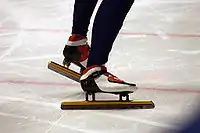skate
English

Pronunciation
- IPA(key): /skeɪt/
Audio (US) (file) - Rhymes: -eɪt
- Hyphenation: skate
Alternative forms
- skait (archaic)
Etymology 1
Back-formation from Dutch schaats, from Middle Dutch schāetse, from Old Northern French escache (“a stilt, trestle”) (compare French échasse and English scatch), from a Germanic language, perhaps Frankish *skakkjā (“stilt”, literally “thing that moves”), related to *skakan (“to shake, swing”).
Noun
skate (plural skates)
- A runner or blade, usually of steel, with a frame shaped to fit the sole of a shoe, made to be fastened under the foot, and used for gliding on ice.
- Abbreviation of ice skate.
- Abbreviation of roller skate.
- The act of skateboarding
- There's time for a quick skate before dinner.
- The act of roller skating or ice skating
- The boys had a skate every morning when the lake was frozen.
Translations
|
|
|
- The translations below need to be checked and inserted above into the appropriate translation tables. See instructions at Wiktionary:Entry layout § Translations.
Verb
skate (third-person singular simple present skates, present participle skating, simple past and past participle skated)
- To move along a surface (ice or ground) using skates.
- To skateboard.
- (skiing) To use the skating technique.
- (slang) To get away with something; to be acquitted of a crime for which one is manifestly guilty.
- To move smoothly and easily.
- March 26 2023, David Hytner, “Kane and Bukayo Saka combine against Ukraine for England’s perfect Euros start”, in The Guardian:
- Addressing a short pass from Henderson, he always felt too smart for Mykola Matviyenko, taking a step to lure him one way; dropping his shoulder and skating in the other direction, further inside.
Derived terms
Translations
|
- The translations below need to be checked and inserted above into the appropriate translation tables. See instructions at Wiktionary:Entry layout § Translations.
Etymology 2
.jpg.webp)
From Middle English skat, scate (also schat), from Old Norse skata (“skate”). Cognate with Icelandic skata (“skate, ray”), Norwegian skate (“skate”).
Noun
skate (plural skates or skate)
- A fish of the family Rajidae in the superorder Batoidea (rays) which inhabit most seas. Skates generally have small heads with protruding muzzles, and wide fins attached to a flat body.
- 1952, Nikos Kazantzakis, chapter 1, in Carl Wildman, transl., Zorba the Greek, New York, N.Y.: Simon & Schuster, translation of Βίος και πολιτεία του Αλέξη Ζορμπά [Víos kai politeía tou Aléxi Zormpá], →ISBN, page 3:
- The fishermen crowding in the cafés were also waiting for the end of the storm, when the fish, reassured, would rise to the surface after the bait. Soles, hog fish and skate were returning from their nocturnal expeditions. Day was now breaking.
Translations
|
Etymology 3
Unknown.
Derived terms
- cheapskate
- labor skate
Further reading
- “skate”, in OneLook Dictionary Search.
Basque
Pronunciation
- IPA(key): /es̺kei̯t/ [es̺.kei̯t̪]
- Rhymes: -es̺kei̯t
Declension
| indefinite | singular | plural | |
|---|---|---|---|
| absolutive | skate | skate-a | skate-ak |
| ergative | skate-k | skate-ak | skate-ek |
| dative | skate-ri | skate-ari | skate-ei |
| genitive | skate-ren | skate-aren | skate-en |
| comitative | skate-rekin | skate-arekin | skate-ekin |
| causative | skate-rengatik | skate-arengatik | skate-engatik |
| benefactive | skate-rentzat | skate-arentzat | skate-entzat |
| instrumental | skate-z | skate-az | skate-ez |
| inessive | skate-tan | skate-an | skate-etan |
| locative | skate-tako | skate-ko | skate-etako |
| allative | skate-tara | skate-ra | skate-etara |
| terminative | skate-taraino | skate-raino | skate-etaraino |
| directive | skate-tarantz | skate-rantz | skate-etarantz |
| destinative | skate-tarako | skate-rako | skate-etarako |
| ablative | skate-tatik | skate-tik | skate-etatik |
| partitive | skate-rik | — | — |
| prolative | skate-tzat | — | — |
Related terms
- skater (“skateboarder”)
Further reading
- "skate" in Euskaltzaindiaren Hiztegia [Dictionary of the Basque Academy], euskaltzaindia.eus
Dutch
Pronunciation
Audio (file)
Derived terms
Verb
skate
- inflection of skaten:
- first-person singular present indicative
- (dated or formal) singular present subjunctive
- imperative
French
Pronunciation
Audio (file) - IPA(key): /sket/
Verb
skate
- inflection of skater:
- first/third-person singular present indicative/subjunctive
- second-person singular imperative
Further reading
- “skate”, in Trésor de la langue française informatisé [Digitized Treasury of the French Language], 2012.
German
Pronunciation
Audio (file)
Verb
skate
- inflection of skaten:
- first-person singular present
- first/third-person singular subjunctive I
- singular imperative
Latvian
Pronunciation
- IPA(key): [skatɛ]
Noun
skate f (5th declension)
- display, exhibition, show (a planned event with the goal of showing, demonstrating something to the public; syn. izstāde)
- modes skate ― fashion show
- tēlotājas mākslas skate ― fine art show
- zemkopības tehnikas skate ― agriculture machinery show
- mākslinieciskās pašdarbības skate ― amateur performance show
- inspection, survey, review (syn. apskate)
- tarifikācijas skate ― classification, ranking review
- iziet skati ― to pass the scrutiny, test, inspection
Declension
Synonyms
- apskate
- izstāde
Norwegian Bokmål
Noun
skate m (definite singular skaten, indefinite plural skater, definite plural skatene)
- a skate (a fish)
- a dried tree without branches
References
- “skate” in The Bokmål Dictionary.
Norwegian Nynorsk
Noun
skate f (definite singular skata, indefinite plural skater, definite plural skatene)
- a skate (a fish)
References
- “skate” in The Nynorsk Dictionary.
Portuguese
Pronunciation
- (Brazil) IPA(key): /(i)sˈkej.t͡ʃi/ [(i)sˈkeɪ̯.t͡ʃi]
- (Rio de Janeiro) IPA(key): /(i)ʃˈkej.t͡ʃi/ [(i)ʃˈkeɪ̯.t͡ʃi]
- (Southern Brazil) IPA(key): /(i)sˈkej.te/ [(i)sˈkeɪ̯.te]
- (Portugal) IPA(key): /ˈskɐj.tɨ/
- (Northern Portugal) IPA(key): /ˈskej.tɨ/
- (Central Portugal) IPA(key): /ˈskej.tɨ/
- (Southern Portugal) IPA(key): /ˈske.tɨ/
Spanish
Pronunciation
- IPA(key): /esˈkeit/ [esˈkei̯t̪]
- Rhymes: -eit
Usage notes
According to Royal Spanish Academy (RAE) prescriptions, unadapted foreign words should be written in italics in a text printed in roman type, and vice versa, and in quotation marks in a manuscript text or when italics are not available. In practice, this RAE prescription is not always followed.